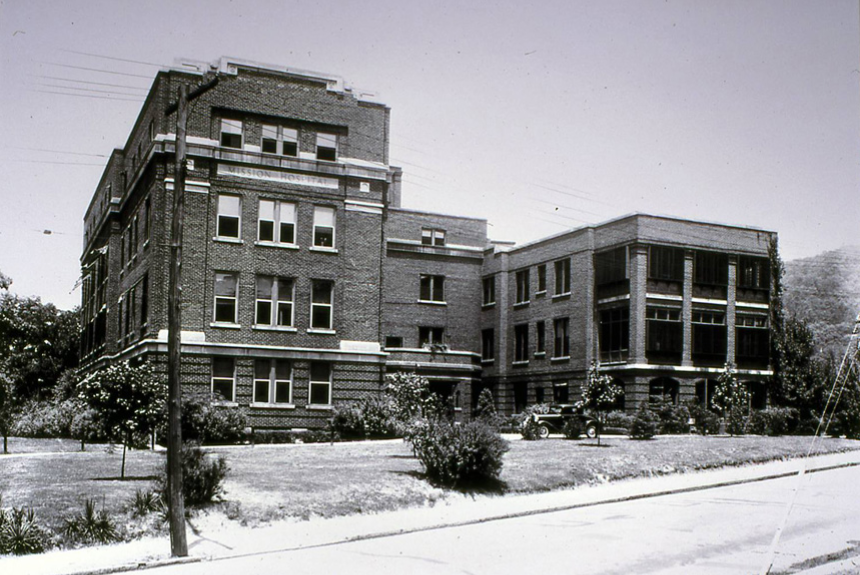The year 1923 started out on a positive note for Mission Hospital. That January, the organization accepted bids totaling $103,863 (roughly $1.75 million in today’s currency) for its new wing. Once construction began, the project was set to take four-six months.
But by early summer, controversy over staffing overshadowed these plans.
“Buncombe County has temporarily withdrawn its support of Mission Hospital as a result of complaints made to the board of commissioners by members of the medical profession with reference to certain rules regarding the treatment of patients in the charity and semi-charity wards,” The Asheville Citizen reported on July 6, 1923.
At the time, the hospital appears to have had three designated areas: the two mentioned above, plus a private ward. Only private paying patients could request outside physicians; those in the latter groups were required to work with hospital staff. Medical professionals outside the hospital network argued the rule was discriminatory.
In the article, a Dr. G.D. Gardner explained to the commissioners how he had been unable to see his patient who was transferred to the hospital due to severe injury. “I was told if he went in the charity ward, I could not treat him,” the doctor said. “The institution receives public funds and some change should be made in the rules.”
The county’s withdrawn support provoked the ire of the paper’s editorial section. In a July 11, 1923, piece, The Asheville Citizen denounced the move. The paper’s primary objections, however, appear hyperbolic in some instances and racist in others.
Opening the charity ward “to ANY licensed physician,” the paper wrote, invited all sorts of trouble. “Perhaps a dope fiend liable to become a murderous maniac” would be placed in charge of the ward and its nurses, the editorial stated. The rule change would also bind the hospital “to admit a colored physician to its white ward[.]”
City officials soon followed the county’s lead, ultimately pulling their support from the hospital due to the policy; the county, however, appears to have ultimately realigned with the hospital, sending its “free patients” to Mission under the original arrangement.
The city’s decision created confusion within the broader community. In an Oct. 7, 1923, editorial, the paper sought to clarify the situation. “Because of the fact that the City of Asheville’s charity patients are no longer treated in the Mission Hospital, some persons may have received the impression that this hospital is closed to charity patients,” The Asheville Citizen wrote. This was not the case, the article stressed. “Mission Hospital is still treating charity cases, as it has done for years past … [and] is legally responsible for its treatment of patients[.]”
That point resurfaced in November, as the annual Community Chest fundraiser for charitable organizations was underway. The Asheville Citizen’s editorial team called on donors to include Mission Hospital in their list of beneficiaries, noting the 187 patients cared for by the hospital out of pocket.
“The Hospital is a non-profit making institution; whatever it clears on its pay-cases goes for ameliorating the suffering of those in unfortunate circumstances,” the article continued. “The Hospital needs money to complete the new wing, in order that its capacity to serve humanity may be enlarged; it needs funds to supplement the revenues received from those able to pay. Any subscriber who fails to include the Mission in his or her donation to the Community Chest fails by that much to offer succor to men, women and children in bodily distress and dependent upon the generosity of those blessed with health and means.”
It appears residents got behind the call, helping Mission end the year the way it began — on a positive note. “The dream of a little company of women, supported by a few men of like far vision, is being realized today in the opening of the new Mission Hospital in its dedication to a larger service of humanity,” The Asheville Citizen reported on Dec. 20, 1923. “It is a temple raised for the relief of human distress.”
Editor’s note: Peculiarities of spelling and punctuation are preserved from the original documents.




Before you comment
The comments section is here to provide a platform for civil dialogue on the issues we face together as a local community. Xpress is committed to offering this platform for all voices, but when the tone of the discussion gets nasty or strays off topic, we believe many people choose not to participate. Xpress editors are determined to moderate comments to ensure a constructive interchange is maintained. All comments judged not to be in keeping with the spirit of civil discourse will be removed and repeat violators will be banned. See here for our terms of service. Thank you for being part of this effort to promote respectful discussion.